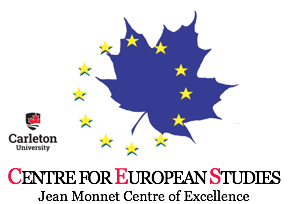Past Event! Note: this event has already taken place.
JMCE Webinar: Taxing Trade to Save the Planet: Europe on the Move!
February 29, 2024 at 10:00 AM to 11:30 AM
| Location: | Online Zoom webinar. **Please note event in Central European Time is 16:00-17:30** |
| Cost: | Free |


The Centre for European Studies Jean Monnet Centre of Excellence at Carleton University in collaboration with the CN-Paul M. Tellier Chair on Business and Public Policy at the University of Ottawa are very pleased to host the webinar, “Taxing Trade to Save the Planet: Europe on the Move!”
Organizers: Patrick Leblond and Crina Viju-Miljusevic
Overview: The European Union (EU) is in the process of implementing a Carbon Border Adjustment Mechanism (CBAM) that seeks to impose duties on imported goods whose associated carbon emissions have not been properly taxed in their home country. The goal is to prevent leakage caused by the EU’s own internal carbon pricing regime, whereby European firms have an incentive to produce in and/or import goods from countries that don’t tax the carbon emissions associated with the production of such goods. The expectation is that the CBAM will lead countries that don’t adequately price carbon emissions in their domestic production to do so. Or, if not, it will lead firms that wish to export their goods to the EU to reduce their carbon footprint. In an ideal world, at least from climate change perspective, the EU would generate zero revenues from the Carbon Border Adjustment Mechanism.
But the CBAM could also lead to global trade’s fragmentation, according to a recent Financial Times article, “How global trade could fragment after the EU’s tax on ‘dirty’ imports”, (published online January 9, 2024) (link to FT) if other countries also adopt similar measures without making them interoperable. It could also lead larger and richer countries like China and the United States to subsidize their firms to develop and adopt new technologies and processes to reduce the carbon emissions associated with their operations, without having to establish a carbon pricing mechanism. In such cases, firms in smaller and/or poorer countries wouldn’t be able to compete internationally, hurting their countries’ economic development.
So, how does the CBAM in particular and CBAs in general work? What are their expected benefits? What are their disadvantages? What about unintended consequences (positive as well as negative) for global trade, innovation, climate change? How do we ensure interoperability across jurisdictions? And what about impacts for less developed economies? What other policy measures are and should be adopted to deal with the impacts that are negative? These are the questions and issues that the webinar’s distinguished panelists will address.
Moderator:
- Patrick Leblond, Associate Professor and holder of the CN-Paul M. Tellier Chair on Business and Public Policy, University of Ottawa
Panelists:
- Neil Campbell, Partner, McMillan
- Aaron Cosbey, Senior Associate, International Institute for Sustainable Development
- Carolyn Fischer, Research Manager of the Sustainability and Infrastructure Team in the Development Research Group, World Bank
- Delphine Sallard, Senior Expert, CBAM, DG TAXUD, European Commission (LinkedIn)
- Joanna Sopinska, Senior Correspondent, MLex

Jean Monnet Centre of Excellence activities are co-funded by the European Union and Carleton University.